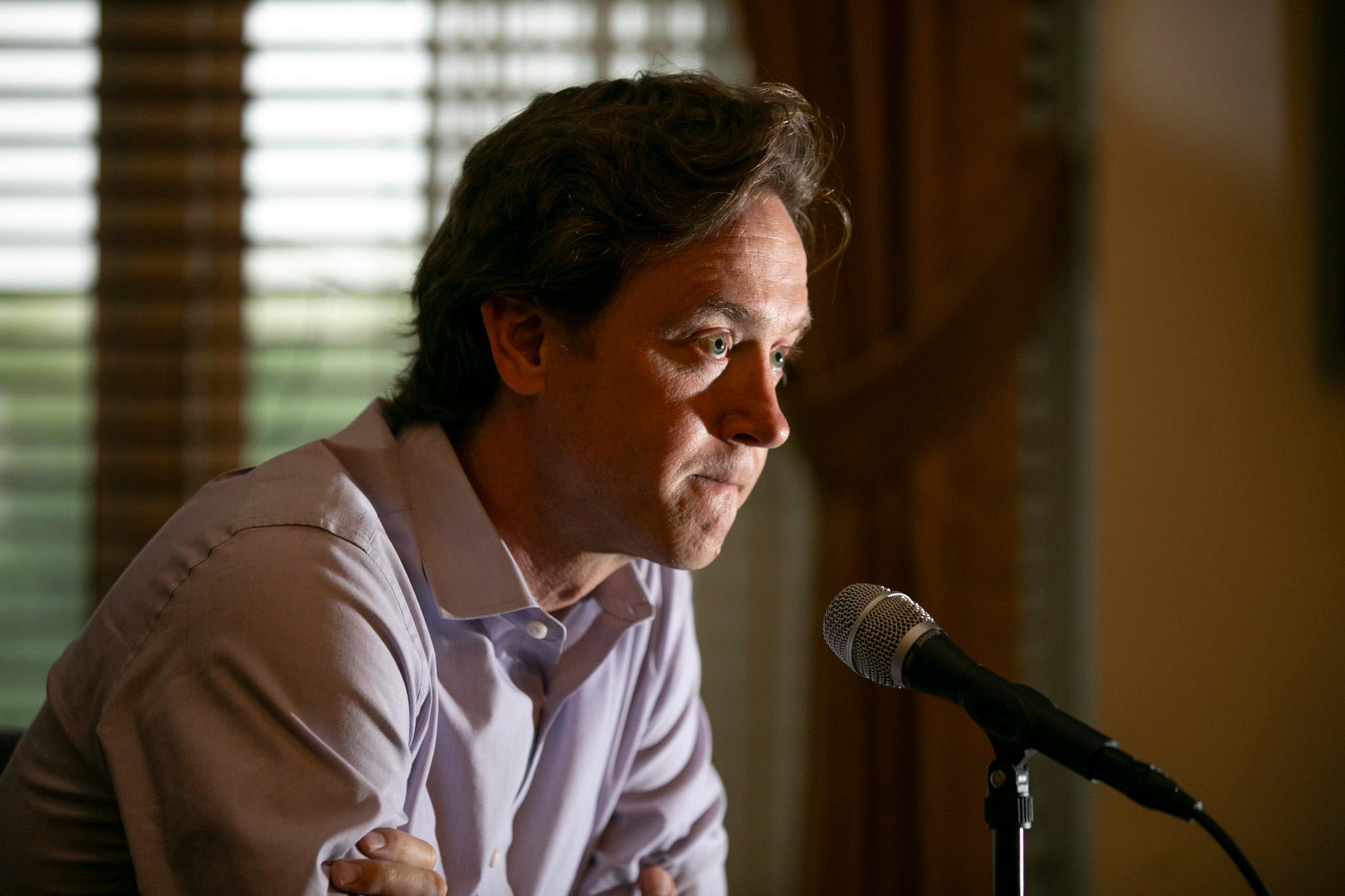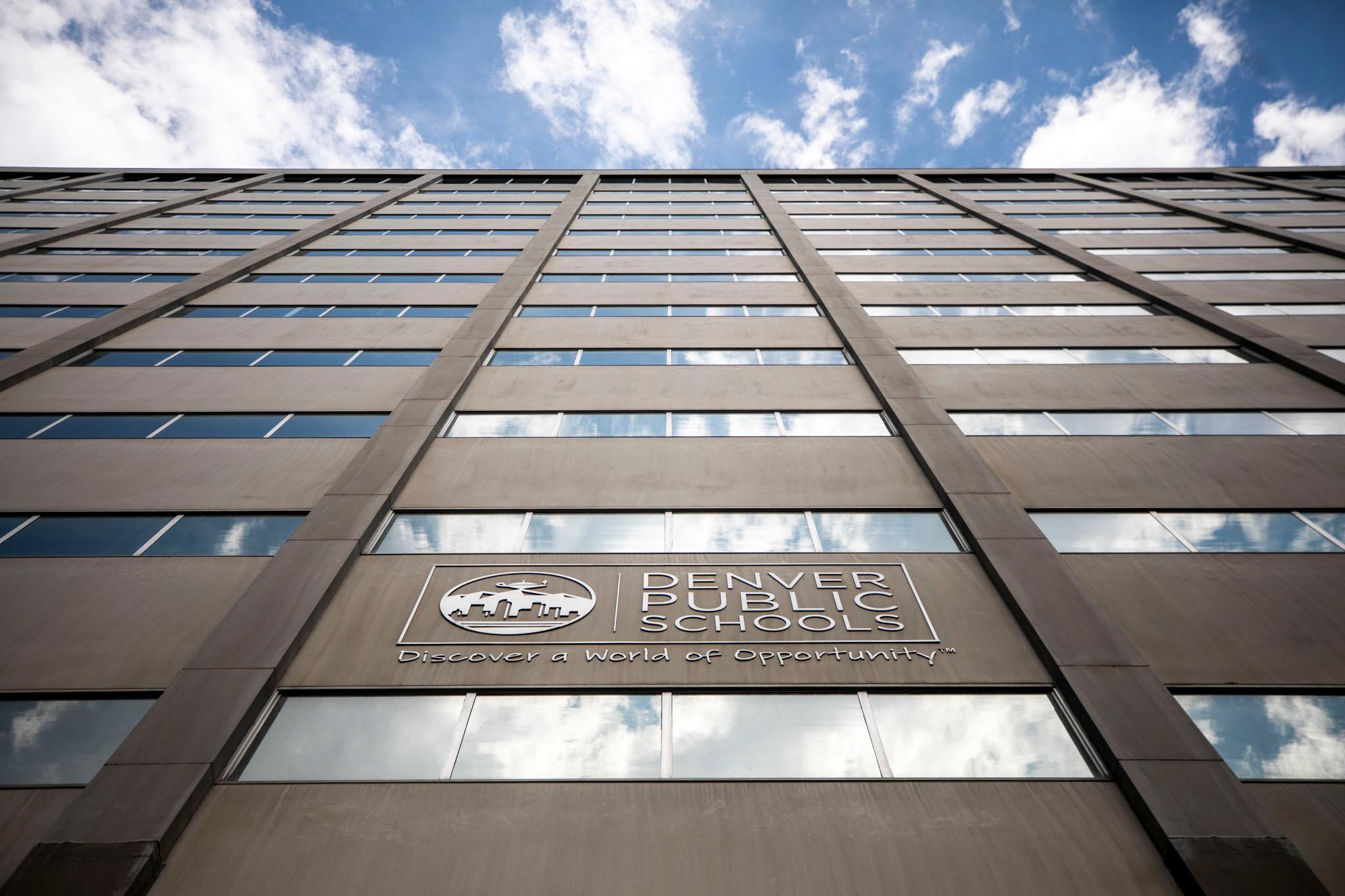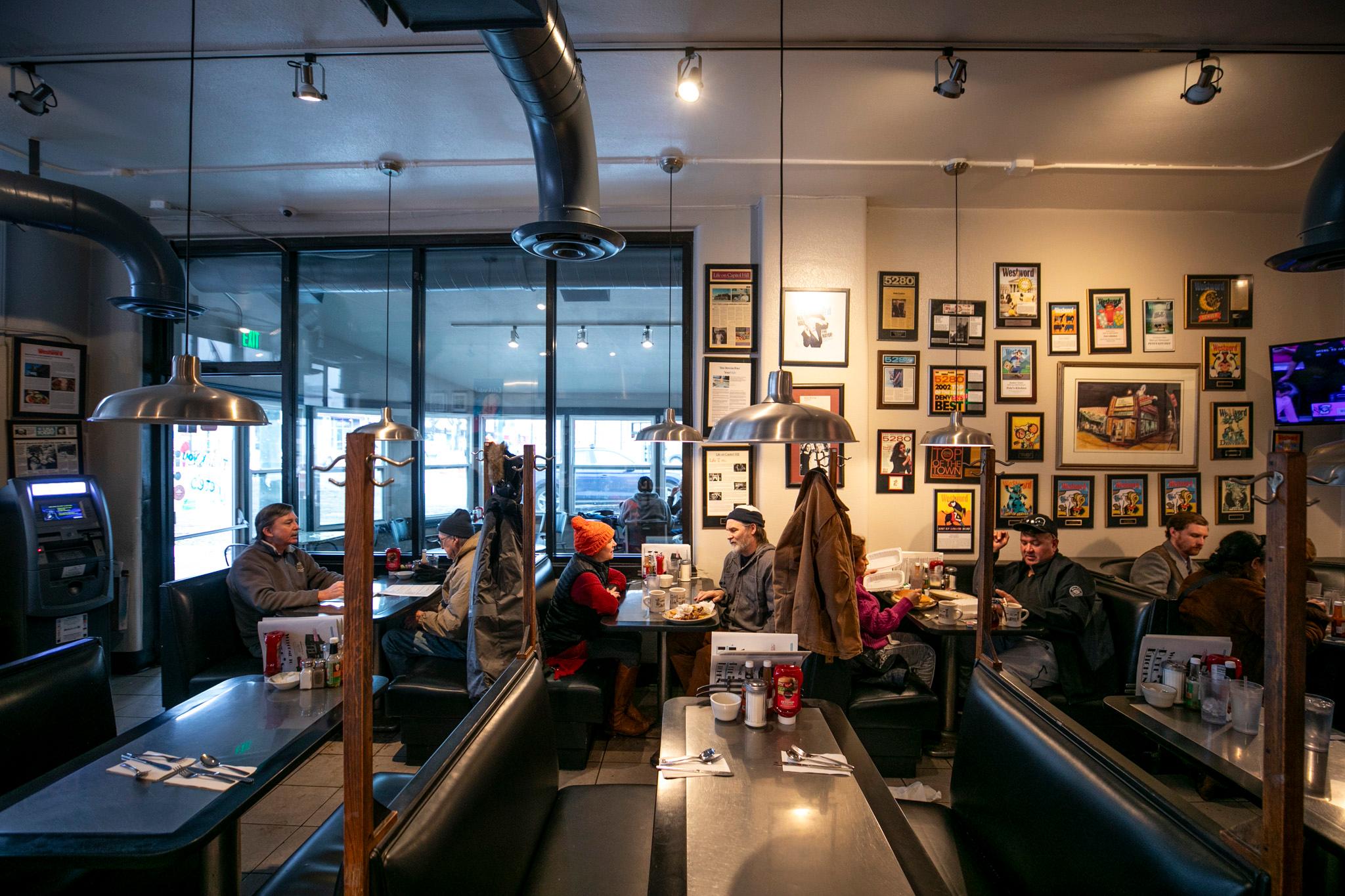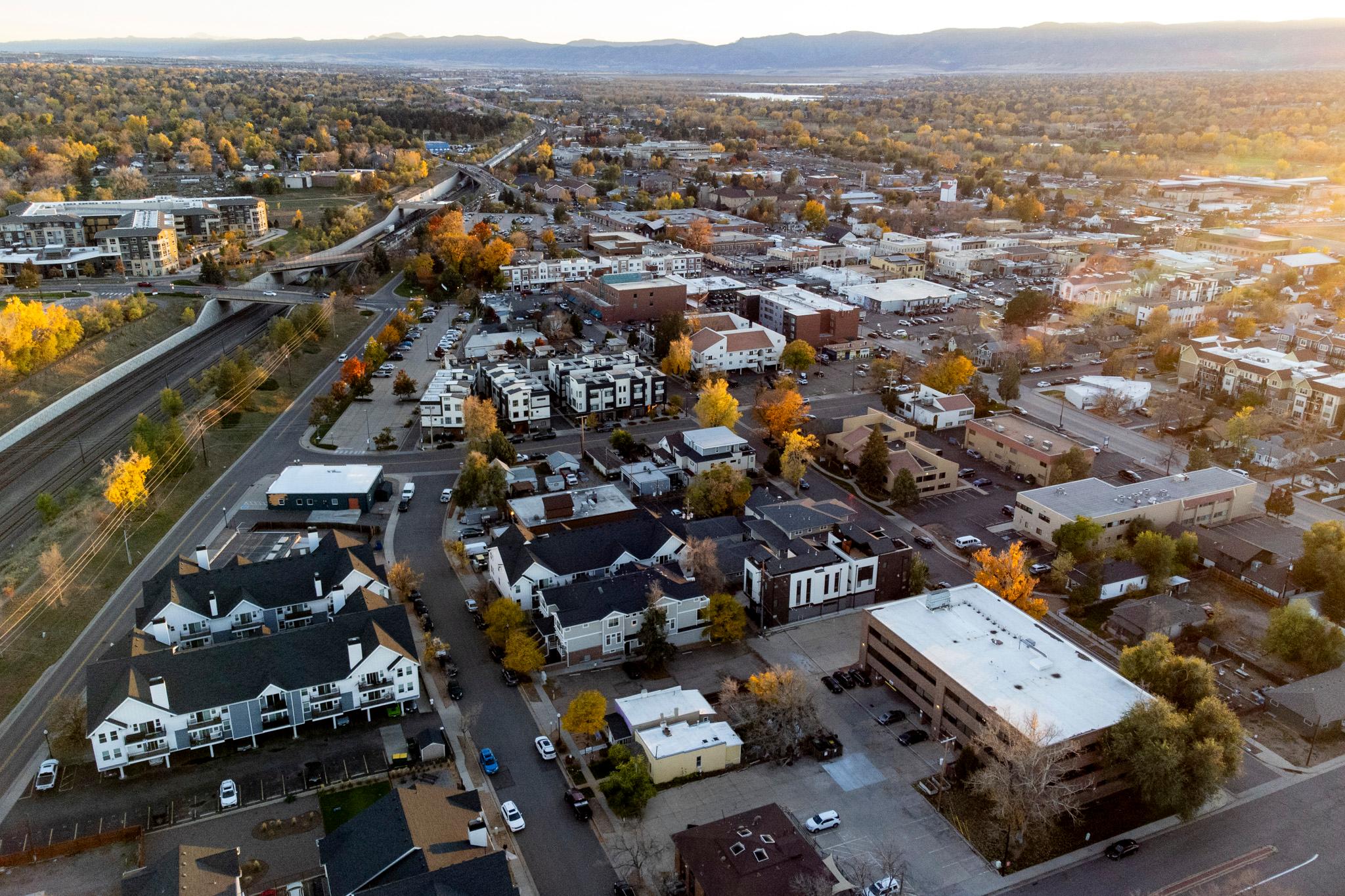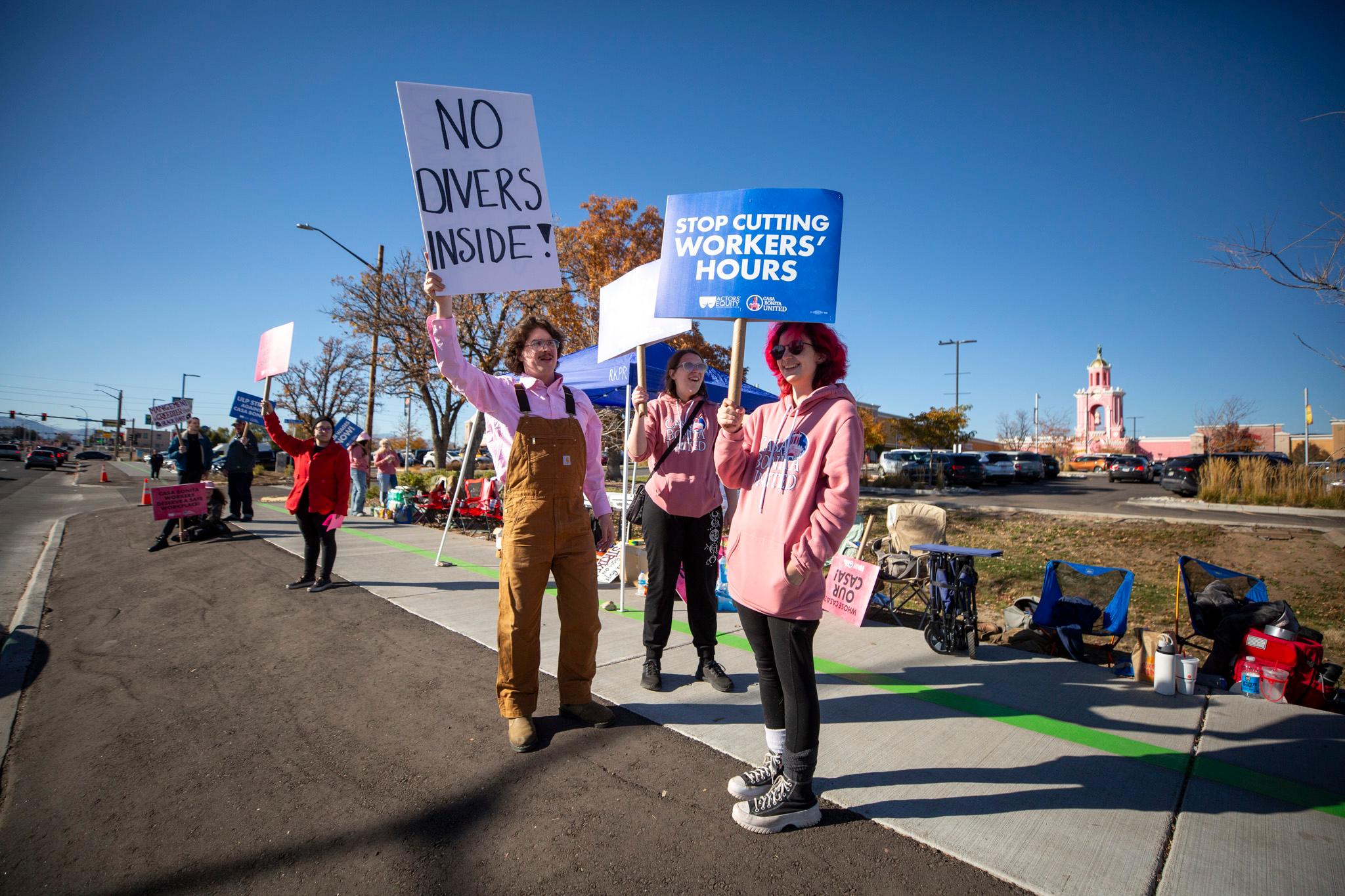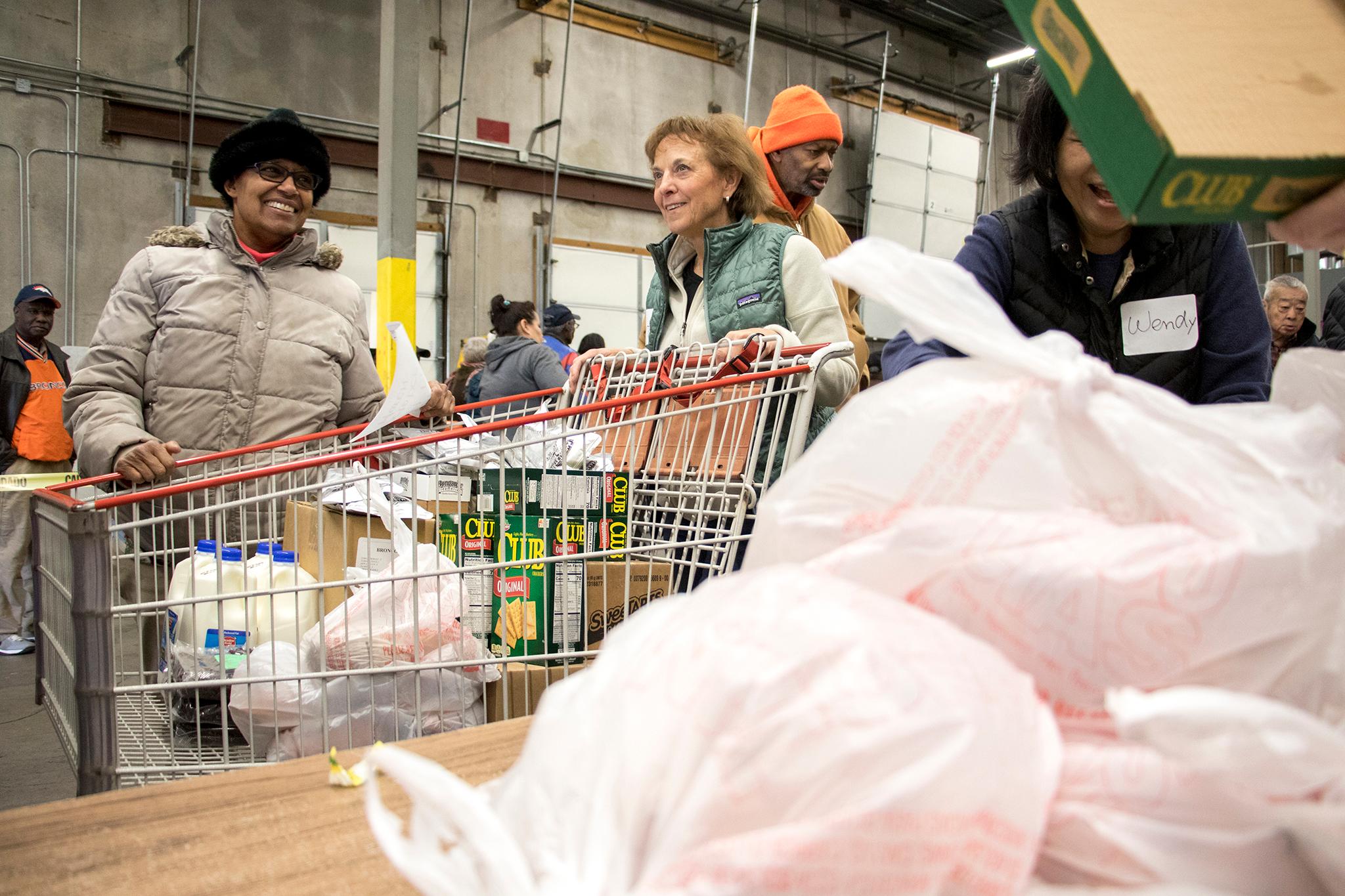Two years into his inaugural term, Mayor Mike Johnston is scrambling to shrink Denver’s government and grow the city at the same time.
He’s asking voters to approve $950 million in debt spending on infrastructure for big projects around town. Meanwhile, he’s preparing for an untold number of layoffs this month as he tries to fill a $250 million budget shortfall.
Meanwhile, he’s promising a new approach to homelessness; facing a rise in eviction cases; trying to save businesses during Colfax’s bus-rapid transit redesign; and fighting to keep the Broncos in town.
Here are five takeaways from Johnston’s recent interview with Ryan Warner, senior host for CPR News’ Colorado Matters.
Do more with less:
Johnston has to cut spending by $50 million for the current budget year and $200 million for the upcoming year. That will include mass layoffs the week of Aug. 18.
“We'll make hard cuts to make sure we have government that works better but costs less,” Johnston said.
Trash collection, cops on the streets and functional parks are all priorities. But he’s still declining to say how many jobs will be cut or what departments, if any, will be protected.
The case for debt spending:
Johnston is asking voters this November to approve the Vibrant Denver bond, which would put $950 million in debt and close to $1 billion in interest toward maintenance projects and new city amenities, from bridge work to the first phase of the Park Hill Park.
The mayor argued that the spending package would take care of critical infrastructure needs. And he said Vibrant Denver — as well as a $570 million package approved by downtown voters — would be a catalyst for continuing growth.
“You actually have to try to drive growth,” he said. “That brings the economy back. And for us, that does mean creating jobs and investing in projects that drive economic growth. A bond does that. This will create almost 10,000 jobs.”
Broncos negotiations in the works:
Johnston said he is optimistic the Broncos will stay in Denver. The Broncos have been widely reported to be planning a new stadium in Burnham Yard, the old railyard in Denver.
The mayor pointed to Lone Tree and Aurora as two cities the Broncos are considering building a new stadium. Those cities may have more land around a stadium for parking, Denver boasts homes, bars, restaurants and shops.
If he has his way, the city will have five professional sports franchises in its city center.
“That makes a huge difference for businesses in this town,” he said. “You talk to retailers. They'll say a home Broncos game drives four days of retail activity because folks come in on a Thursday, they shop on a Friday, they stay through Saturday, Sunday or Monday.”
More housing of all types:
Johnston reiterated his goal to convert office space to residential, bringing some 4,000 new housing units to downtown.
He also called for more housing development, saying rents dropped because of record apartment construction.
“While it is dropping, it is not dropping enough to meet the ability to pay of where most Denverites are, right?” he said. “I think it shows that we still have more work to do to close the gap. But it does show if you can build enough supply that the market will naturally start dropping prices, and that's what we need to do.”
Johnston is particularly focused on adding housing that is affordable to working-class people, he said. And he’s especially hopeful that the BRT project on Colfax Avenue will bring a new housing boom there.
Evictions and homelessness:
In a recent speech, Johnston outlined a somewhat tougher approach to homelessness, saying the city could use the threat of criminal sentences to push some people into treatment for mental-health and addiction issues.
In the interview, he said that the goal was to stop crimes like theft and public urination that are affecting downtown businesses. But he said the goal was still to use incentives, not punishment.
“I think that it is designed to be carrots all the way along. But what we know is if people keep offending. They'll be facing criminal charges, and we think if they're facing criminal charges, they should be sentenced to places that still offer treatment options and give them real chances to recover,” he said.
Meanwhile, as the city faces record-high eviction cases, the mayor is working to prioritize how the city helps the most vulnerable people.
He said eviction cases are running high because, despite a softening market, rents are still high, and Denver remains a popular destination for young people.
“My dad used to say the only thing that's worse than being hated,” the mayor said, “is being loved.”
Below is the full transcript of the interview:
Ryan Warner: Mayor, thanks for having us again.
Mayor Mike Johnston: Thank you so much for being here.
Warner: The city faces $250 million in cuts, and at the same time, you and City Council are pushing for $950 million in bonds — debt. The idea is to reenergize the economy through catalytic projects, but from the posts I'm seeing on social media, for instance, it creates dissonance for many voters. Make your case for why they should take on more debt, pay a bank a billion dollars in interest on the eve of layoffs.
Johnston: Yeah, while it seems counterintuitive, it is exactly the most important thing you want to do in tough economic times. So first of all, it is right. We have a budget gap of about $200 million for 2026. That's driven almost entirely by dropping sales tax revenue, which is brought on by the slowing of the economy, sort of all of the tariffs and the Trump recessions. Since the end of 2024, we've seen people stop going out to dinner or buying refrigerators or going out to movies, and that drives sales tax declines.
Warner: You've called it a Trump recession. We're not technically in a recession.
Johnston: No, I've just called it a slowdown. But I think that what we've seen is normally our sales-tax revenues increase by about 5 percent a year. We projected this to be a bad year at 2.5 percent growth, and it actually turned out to be 0 percent growth, so it's total flat on revenue. So that is a dramatic, dramatic change in sales tax, and you're seeing that in cities across the country. San Francisco, same population as ours, is over a billion dollars behind. L.A., Chicago: multiple billions, Houston, blue cities, red cities, Phoenix. That's happening everywhere. We do have to run a balanced budget. We're not like the federal government where you can print money or hand on a deficit to your kids. So we'll do that. We'll make hard cuts to make sure we have government that works better but costs less.
But at the same time, there are two ways to balance a budget.
One is you reduce your expenditures. The other is you have to increase your revenues. You actually have to try to drive growth. That brings the economy back. And for us, that does mean creating jobs and investing in projects that drive economic growth. A bond does that. This will create almost 10,000 jobs. We project it'll drive about $2 billion of economic impact across the city, and it will create those places and spaces that not just make people want to stay in the city, but they also drive economic growth. That's true for roads, that's true for rec centers, that's true for libraries, it's true for parks, and it's also part of just doing your regular maintenance on a city. The same thing you know about your home. You can not do preventative maintenance on your home and wait until the roof collapses and it's far, far more expensive. And so for us, this kind of preventative maintenance is what cities do regularly. Every five to 10 years, we're on schedule to do that. But if you don't do it, the deferred maintenance gets catastrophic and gets far more expensive.
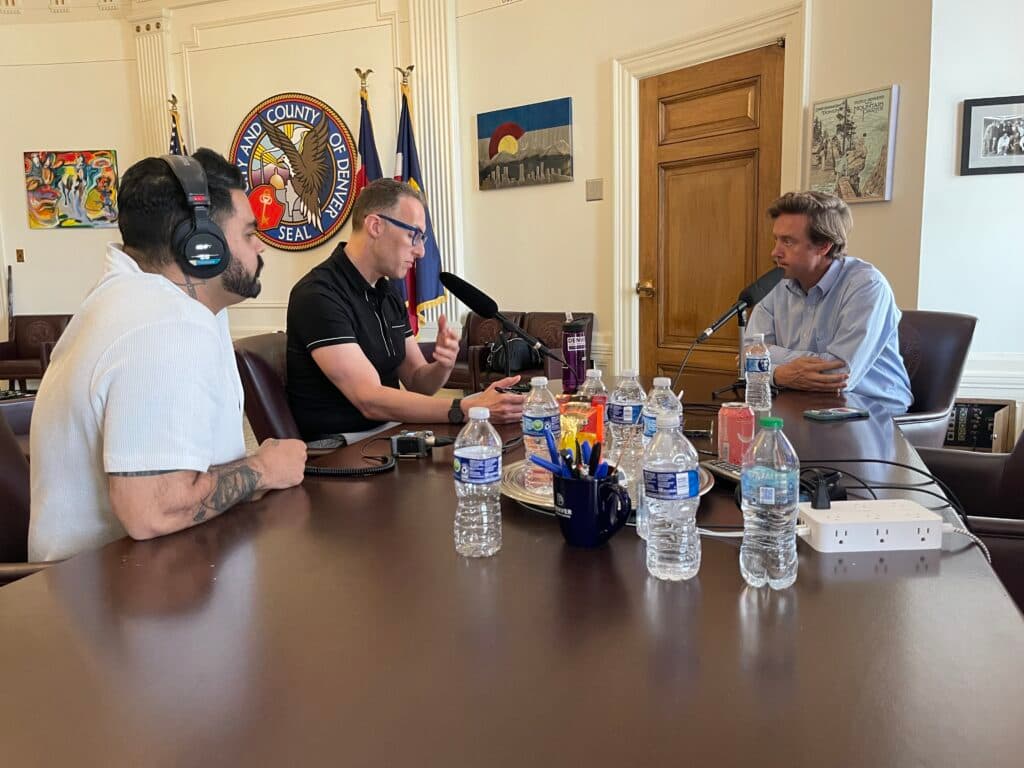
Warner: Without a bond package like this, it's possible that you could help people's taxes go down.
Johnston: No, they don't. And I'm really glad you raised this because it is a very important issue and it is, I think it is misunderstood. First of all, obviously no tax increase is required to support a bond. And actually right now we have a debt schedule where we have multiple forms of debt in the city. Bonds are one of them, but there are other sources and we pay them off over time, and so if this bond were not to be proposed or were not to pass, you would see no change in your property taxes. We still have about a 20-year time horizon to pay off debt the city has from other issuances, and all that would happen is you wouldn't add new debt, so you might pay off that current debt faster. But your mill levy does not float down because of it, and your property tax payments do not change as a result of it. Maybe [property taxes] would change 15 years out instead of 19 years out, but there would be no change and any impact on someone's property tax if we were to not pass the bond.
Warner: Do you want to point to a project that you think will be a catalyst for, let's say, job creation? I mean that's fascinating in the face of the city about to lay people off.
Johnston: There are really two strategies here. One is the bond. The bond is really focused on a lot of maintenance and repair of city assets, which are not as sexy, but they're really important. A bridge isn't important until it collapses, then it's a real problem. Our other strategy to drive real economic development right now is the Downtown Denver Authority. This is another pool of dollars we're investing that voters approved in a small electorate in downtown. That's $570 million. These are places where we are driving investments that will absolutely drive economic growth. For instance, converting 4,000 apartment units out of empty commercial office buildings in downtown. That's a huge driver.
Warner: You want to make downtown residential again?
Johnston: We do.
Warner: And one method for that is to convert office buildings —commercial real estate’s in the toilet — but make those when possible into apartments.
Johnston: Yeah, we want to convert empty commercial buildings into residential that both fills up those buildings and adds more units in downtown where people can afford to live. We want to be able to build more great public spaces that attract folks who want to be and spend money in downtown. Think about Union Station or Larimer Square right now as great examples of that. There'll be parks, there'll be outdoor bars, there'll be soccer fields, there'll be play spaces. And the third is we want to incentivize great Denver businesses to stay in downtown or to come to downtown. Those are really catalytic investments.
I say that, Ryan, because you said which of the bond projects are economic catalysts? I would say most of our economic catalysts are in the Downtown Denver Authority spending. Really, our bond projects are meant to be maintenance and support of city assets, and we don't believe that necessarily a library on East Colfax is a major economic catalyst, but it is a really important community asset to folks who live on East Colfax and don't have access to a library or for folks who want more housing on East Colfax. That's true for rec centers, for parks, for libraries.
I do think that the Park Hill Golf Course, when developed, will be a great driver of economic catalyst. It'll be the largest new park in 120 years. That means more people want to visit there, want to live by there. We hope to have the ability to buy food and drinks and even alcohol there, and so we'll look for revenue generation at that site.
Warner: Cyclists seem a little peeved that there's not much investment in safe infrastructure for them with this.
Johnston: Yeah, we met with them yesterday, had a good conversation. We share a lot of the same goals about wanting the city to be a place that is very pedestrian and bike-friendly, and we're continuing to do many things on that. We're now at about 250 miles of bike lanes and bike trails. We'll build another 38 miles between this year and next year, and there are key projects in this bond that will protect pedestrian and bike safety in really important ways.
Our 38th Avenue rebuild, which is in the bond, we had a biker die there just this year, which was heartbreaking to see. 13th and 14th [avenues] will involve slower, safer streets. The rebuild of Evans [Avenue] will do that. The Santa Fe [Drive] streetscape. All of these places are to be redesigned to be safer for pedestrians, for bikes and for cars, and that's a big part of what we see in the package and a big part of what we're already spending. These 38 new miles of bike lanes this year and next year are already in the budget, so they didn't need to be in the bond.
Warner: We spoke some of job creation. Let's talk about job elimination. City government is about to shrink later this month. How many jobs? Is there a headcount?
Johnston: We don't know that number yet. We're working with all of our departments to do it. I want to step back and first say, obviously, this is a scenario that nobody in Denver ever wanted to see. No one on our staff ever signed up to do this job because you want to cut budgets. So what we've done is really focused on how do we protect and preserve all of our core city services. We're going to make sure we still have officers on the street and we still have folks picking up trash and keeping parks open. How do we do everything we can to protect our employees and to not have them affected and to keep on track with our big citywide priorities?
We're not going to give up on homelessness or affordable housing or public safety. At this table, I've talked with every single cabinet member multiple times, and those are always our top priorities. And so we'll do everything we can to minimize the impact. It's an incredibly hard and heartbreaking decision to ever have to let go of an employee, and so we are going to do it sparingly and with as much dignity as possible.
Warner: Am I to take from your answer that trash collection, parks, law enforcement and efforts to minimize homelessness — are those insulated from cuts then?
Johnston: No. I'm just saying within each department there are core public services. There's a lot we do in the Department of Transportation and Infrastructure. One of them is collecting trash. We're not going to say to fix the budget, we're going to only collect trash once a month instead of once a week. We're not going to make decisions that have profound impacts on core city services.
Warner: How much of the budget cap will the layoffs cover?
Johnston: We won't know that until the budget is final and until we make announcements, but I won't share any of that data until we share it directly with employees and with departments. So that'll be the week of the 18th of August.
Warner: The city is going to host its second artificial intelligence summit this year, and it made me wonder if there are savings you anticipate through cities relying on AI.
Johnston: We don't have any specific savings in this budget. What we are working on is, we have a program called Peak here, which is led by city employees who get trained in how to find deficiencies in their own department to make government run more smoothly. We have a guy on our graffiti cleaning team. The previous policy was if someone graffitied your store, you'd have to go to that store and bring a release form that that person would have to sign and then fax back to the central office where the office would have to approve that form and then call back to the person on the street to then start erasing the graffiti. That takes days.
Warner: I think I remember what a fax is. I think I remember it.
Johnston: So we had one of the guys on our team who said, “This is crazy. Why don't I just have an electronic form in my hand, and I can show it to [the business owner] and have him sign it.” His even better idea is why don't we have every business in the city be opted into an agreement that they would like for us to remove graffiti from their building unless they explicitly ask us to keep the graffiti on their building. We'll just go ahead and start cleaning it.
Warner: Did Denver, did you, did your administration live too high on the hog?
Johnston: No, I don't think we did.
Warner: When I bounce a check… I mean, fortunately, I haven't done that since college. I'm in a fortunate position that way, but when I bounce a check, I have to look at my part in it. What is your part in where we are right now? I understand there are many forces outside that you don't have control over.
Johnston: Yeah, I think I want to go back to the budget process a year ago where folks were very mad at us because we were, for the first time in 15 years, reducing the size of government and slowing the growth of government. And people, including news outlets in the city, editorialized that that was irresponsible. We should just take out a fund balance and not cut city spending. And the reality was we budgeted for a 2.5 percent increase in revenues, and that seemed to be conservative or excessive. And now the revenues [in terms of growth] are actually 0 percent. So we predicted half of this slowdown, not the other half. So we already started taking corrections a year ago to say, we think the costs of the city are growing. And we think the revenues of the city are shrinking.
Warner: I want to talk about Colfax, which is all of a block [away] from us. Businesses are sending distress calls. The latest one I saw in social media from the venerated diner Pete's Kitchen said, “The construction on Colfax has impacted us far more than we could have imagined. Colfax small businesses are hurting. So mayor, is this going to be bus-rapid transit to nowhere?”
Johnston: I was just at the Satire two weeks ago, meeting with their family.
Warner: Satire Lounge?
Johnston: Satire Lounge and Pete's, they're both owned by the same family. They’ve been here historically, both icons on Colfax. And I'm worried about the same impact. I mean, I will say the bus-rapid transit was already underway and approved before I came in, so I was responsible for implementing it.
But this is the challenge. People are excited about the long-term impact, but they have to remember it involves two years of construction on one of our most beloved streets. And that's a real challenge. So that's why I've been doing activations and events up and down Colfax, including bartending at the Satire to say, “We need people to keep coming to Colfax, because if not, when the bus-rapid transit is open, you'll find some of your favorite restaurants and bars are gone.”
I think there'll be lessons to learn on how we do it. I think we'd have to have a long conversation before we decided to do a center-running bus-rapid transit. Again, that's what makes this one so expensive and so time-consuming. You could do a side-running BRT, which is much cheaper and faster. And so were I here then, I think I would've wanted to have that conversation. But I think what we'll look at now is how do we make sure this project is successful, we sustain all these businesses along the way?
Warner: Well, answer your question. How do you sustain the businesses along the way? I mean, not that that's a city's job, but you clearly are interested.
Johnston: I mean, we do two things. One is we're one of the only cities in the country that actually has a fund that we use to help give financial support to businesses affected by construction projects like this. I'm going to say right off the bat, it is not enough. Pete’s, they were sharing with me they're down $5,000 or $10,000 a month in revenue. I mean, those are dramatic changes, because if you have fences all in front of your property, people decide not to stop and eat.
I think we have to, as a city, really own if we love Colfax, and we do. You got to keep shopping there even if it's hard to park for a while and you got to decide. I went to dinner with my wife on Colfax this past week. We're looking to find places to go; choose Colfax. And also then what we want to do is then really support that BRT by building density along that bus line.
Warner: Housing.
Johnston: Housing. You want people to live on that corridor. You want people to live on Colfax, so you can jump on the BRT and get from your home to your job downtown easily or your home to your favorite restaurant easily.
Warner: Speaking of development, the city has acknowledged that two bridge projects totaling about $140 million are part of a larger conversation about the Broncos moving their stadium, and you've pledged to keep the Broncos in Denver. Quick update on where negotiations are.
Johnston: Yeah, we are still working hard at it. We have a real vision that we want them to stay in Denver and build into a community where they can make a real difference. We think they share some of those values, and so we are working hard at it, and I'm optimistic we will get to a deal that keeps them in Denver. But we're not there yet.
Warner: Who's your competition?
Johnston: I think they've mentioned publicly that they've talked both to Lone Tree and to Aurora about other options, and so I know any team does their due diligence. This is happening in cities around the country: the Browns are leaving Cleveland, the Bears are leaving Chicago.
And I think that right now we would love to be, I think maybe the only city in America that has five professional sports franchises all in their city center, with our new women's soccer team.
That makes a huge difference for businesses in this town. You talk to retailers, they'll say a home Broncos game drives four days of retail activity because folks come in on a Thursday, they shop on a Friday, they stay through Saturday, Sunday or Monday, and that's where we're heading — is to not be a place that has stadiums with 80 acres of vacant parking lots around them, but stadiums that have places where you can live and bars you can go to and restaurants you can eat in, stores you can shop all in the same spot.
Warner: What is not in Denver's favor when it comes to the Broncos?
Johnston: Oh, I think we probably have less space than other places do. There are a lot of places that are doing this move to the suburbs, like Foxborough, right? You just build the 80-acre parking lot in the middle of an undeveloped area for …
Warner: The Patriots.
Johnston: For the Patriots. So I think that's what other cities are doing. I think Dallas did that when the Cowboys moved out of Dallas. That's not our vision, and I hope, think it's not the Broncos’ vision. I think they would like to be immersed in the culture and the identity of a city that they believe is historic, and so I've been very encouraged by the conversations.
Warner: You spoke in the State of the City of treatment for people with mental health issues and substance abuse issues. You talked in fact about using the criminal justice system to push people to treatment. Were you suggesting changes there?
Johnston: I'm glad you raised this. So we have launched over the last two years a program called Roads to Recovery, which is targeted specifically at folks with serious addiction and mental health needs. And what it is is just a chance to identify folks that are struggling and put them on a road to recovery. If that means you need housing, we help 'em get housing. If it means you need treatment. We’ve already served 200 or 300 people. That's a great start.
As someone who has addiction in my family and some mental health on both sides of my family, you know that sometimes people are really ready for treatment, sometimes they're not, and you have to find them in the places that they're ready. What we do know is when we have a small number of people who are continuing to commit crimes regularly, whether those are theft or that's assault, whether that's public urination or distribution of drugs, we both want them to choose treatment, but we also cannot allow them to continue to break the law over and over again. We can't have small businesses going under because people walk in and just steal their stuff all the time.
Warner: And it sounds like these are repeat offenders? This is costing the city, it’s costing its residents.
Johnston: It has a massive impact on our small businesses.You saw there was an establishment at Union Station that just closed two weeks ago that said one of their biggest challenges was retail theft. Folks that would come in and steal all of the mostly clothing and handbags and other things. So it has a real impact on business.
So yes, if you are a repeat offender who is committing those types of crimes, but when we arrest you and find out that one of the things driving those crimes is either mental health needs or an addiction, what we want to do is then be able to have you get into supervised support where you can get treatment for those needs, best case scenario, and keep you out of the criminal justice system entirely.
But sometimes you have versions where you can have court supervision, where you're checking in for urinary analysis to show that you're clean or taking a drug test or meeting with a counselor.
You can have checkpoints to meet your part of the deal, but yes, if someone continues to break the law over and over and they're end up facing a sentence, what we have now in our county jail is programming in our county jail that has inpatient mental health treatment, an inpatient addiction-based treatment. So you have really a sheriff's deputy that opens or closes the door, but all the staff inside that unit are social workers, or mental health counselors and support.
So we want to then have an option where if you've reached the end of the road and you are going to be sentenced, we still want you to be in a place where you can get access to treatment. And when you leave that place, we would incentivize it by saying, we can help you find housing when you exit, help you find a job when you exit, help find you the medication and treatment you need. Because often when folks exit, they're right back on the street, and they start re-offending again.
Warner: So you describe this as more carrot than stick.
Johnston: I think that it is designed to be carrots all the way along. But what we know is that people keep offending. They'll be facing criminal charges, and we think if they're facing criminal charges, they should be sentenced to places that still offer treatment options and give them real chances to recover.
Warner: I want to talk about President Trump's executive order against housing-first models, harm reduction, which has to do with substance use and certainly the homelessness strategy at the same time. His push toward mandatory treatment echoes a little bit of what you've said, but do you have a sense yet of how the executive order could change Denver's approach?
Johnston: We have not seen any indication that they will deny funding or change practices. I mean, what we'd love to see them help us do is put in more dollars to build more housing and build more units. That's the best thing they could do to help support us. We're actually seeing a loss of housing funding from the federal level. About 180 housing vouchers we use to help people get into housing have been cut from a combination of federal cuts and state cuts —
Warner: Meaning on any given night there were 180 people you could put up in a hotel, for instance, that you can't now?
Johnston: Not only that, 180 people who we could actually put in a permanent apartment. … These were longer-term vouchers. These are long-term. These vouchers might be two years, some are five years, some are lifetime. So if you have someone with a serious physical or mental disability who can't get a job, these vouchers would've been lifetime rental support. So for the most acute populations, these are the most important tool, and they're cutting those, which means our most acute populations won't have a place to get access to permanent housing.
Warner: How do you explain rising evictions at a time when we're seeing higher vacancy rates and dropping rents?
Johnston: Yeah, I think that it is a function of the market still being so expensive that, while it is dropping, it is not dropping enough to meet the ability to pay of where most Denverites are, right? So if you say, good news, it's not $2,000 a month anymore. It's $1,800 a month, I think it shows that we still have more work to do to close the gap. But it does show if you can build enough supply that the market will naturally start dropping prices, and that's what we need to do.
What we want to do is build more and more supply of housing that's affordable for someone that's working as a waitress in downtown. And we think actually one of the benefits of these commercial-to-residential conversions of these office buildings downtown, as a lot of these units will be smaller and so they're naturally more affordable. And then we can add affordability on top of that, which means you can build a lot of housing in downtown, all of which would be something you could afford as a regular working Denver at $50,000, $60,000, $70,000 a year of income.
Warner: I mean, according to the eviction lab at Princeton University, Denver's increase in evictions defies the national trend. So the scenario you've painted there is true of many different cities, but what's the special sauce here with the evictions?
Johnston: Well, I think the special sauce… My dad used to say the only thing that's worse than being hated is being loved. Denver is still a destination city for folks from around the country. It is still one of the two most…
Warner: We're not losing?
Johnston: Well, it is still one of the two most popular places for folks under age 30 to move. So we still do have a lot of folks that are moving in. We do have people that are moving out, and those people that are moving out are often moving out because they can't afford to stay. And so what you see is we'll have higher-income earners moving in and lower-income families that are being forced to move out and move out to the suburbs or out to different locations.
It's always a stab in the heart when you meet a family who says, I'm a school teacher, but I got to move back to Kansas because I can't pay the rent here anymore. So I think it is a function that Denver got so hot and the market increased so much that even if it corrects a little bit, it outgrew the capacity for someone making $40,000 or $50,000 to raise a family. And so that is why we're most committed to adding more and more housing stock to try to solve that problem.
Warner: This is a little bit of a philosophical question, but it no doubt would lead to policy. Fascinating to me that the Centers for Disease Control and the National Institutes of Health say that eviction leads to mental health issues, suicide, addiction, and overall physical illness. And I wonder if you've ever thought of eviction as a public health issue?
Johnston: I have. And we see street homelessness as absolutely a public health issue for just that reason. Not just, ‘Are you at much increased risk of overdose or of freezing to death or dying of heat stroke?’ I had a doctor who I consult about this who said, literally, if you had to perfectly engineer a drug to survive being homeless outdoors on the street in the wintertime, you need a drug that kept you up all night so you wouldn't get attacked, that helped you survive through long periods of cold, and that suppressed your hunger. That is called fentanyl. That is perfectly what that drug equips you to do is survive all three of those ingredients.
And so yeah, the more exposed you are to homelessness, the more at risk you are for those drugs. The more at risk you are for exacerbated mental health risks. Think about being in a tent every night. All those stressors go way up, and your need to cope with either self-medication and drugs or added mental health conditions are serious.
Warner: Last year, the city offered less emergency rental assistance. Are you prepared to increase those funds in 2026?
Johnston: We actually dramatically expanded rental assistance last year — almost by $20 million. The state reduced some of their support. We dramatically expanded the city's investment. It went from about $3 million to more than $20 million. So it was a big expansion.
Clarification: While the city’s overall amount to give in emergency rental assistance shrank because of the end of pandemic-era federal funding, Denver did dramatically increase city spending. In 2024, Denver budgeted $31.3 million for eviction prevention. Much of that came from pandemic-era federal dollars. In 2025, the city offered $25.5 million in emergency rental assistance.
We are still very focused on preventing eviction. I think what we want to be better at is making sure that we are focused on eviction prevention that prevents homelessness, because unfortunately, what we know is there are multiple people that will face evictions. Some people will be evicted because they threw parties in their house and they weren't allowed to do that or because they didn't pay their rent on time or because they got two dogs, they're not allowed to have dogs, or they were smoking in their unit. Those folks will get evicted but will have other options of places to go that will keep them housed.
Warner: Not all evictions are the same.
Johnston: Not all evictions are the same. And in a place where we have to be really thoughtful about how to use resources, we want to make sure we're prioritizing those that really are at risk of homelessness, and we will keep doing that.
Warner: And how do you identify that?
Johnston: You should have Jeff [Kositsky] from our HOST team who helps lead this effort come on and talk about it.
Because we have really carefully learned and observed and talked to people about what are the key indicators that show us whether you have some protective factors that say you might not be able to pay the rent, or you might get evicted. Whether you have options or places to go or you have a history, whether it is addiction, mental health, previous chronic homelessness, lack of family support structure — where we think you, without a place to stay tomorrow night, actually don't have anyone else to call.
Warner: Sounds like an algorithm. Everything's an algorithm.
Johnston: This one is a very human-driven calculation of what do we know about your risks and how do we try to support you through those.
Warner: Thanks for being with us.
Johnston: Thanks for having me.
